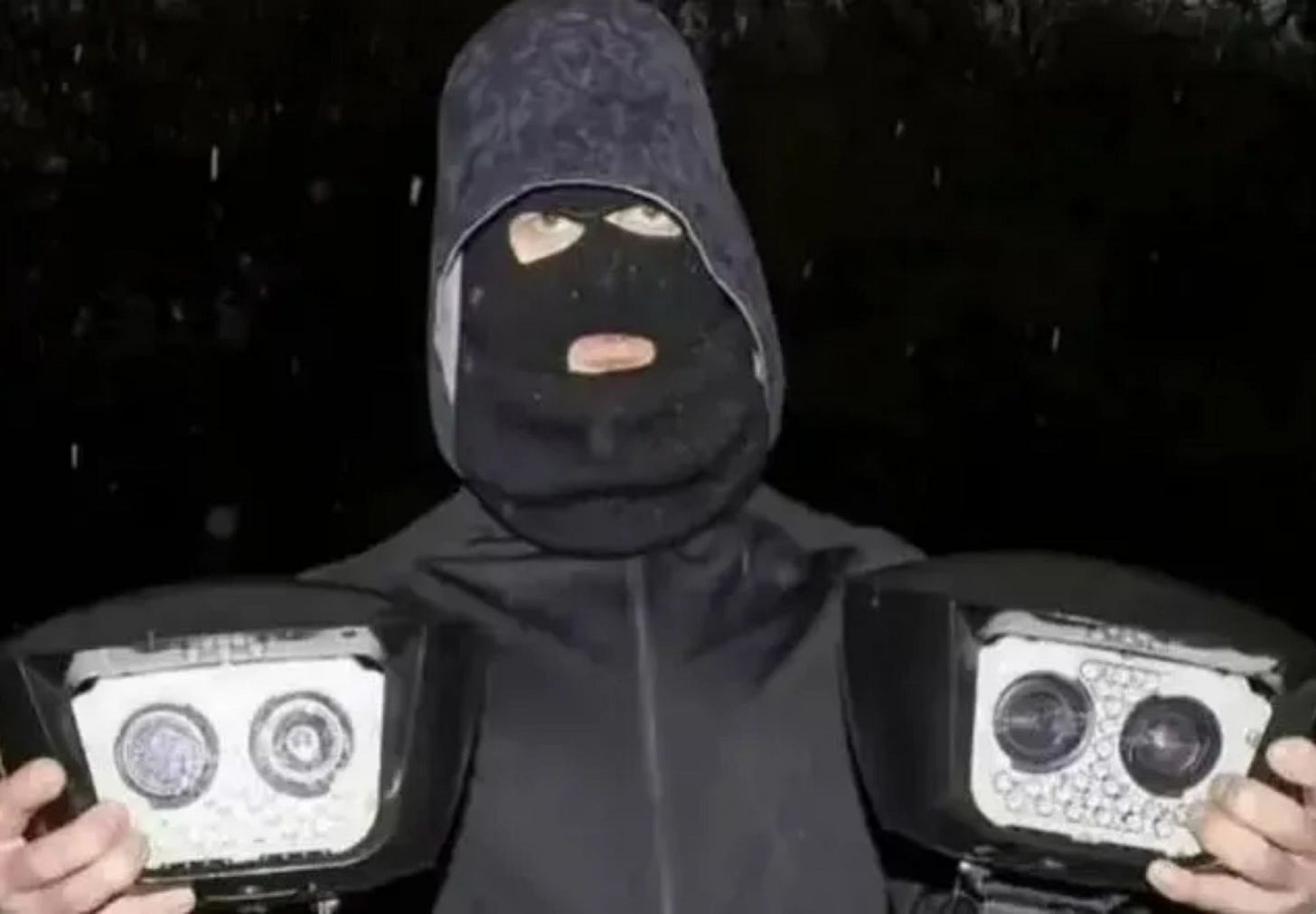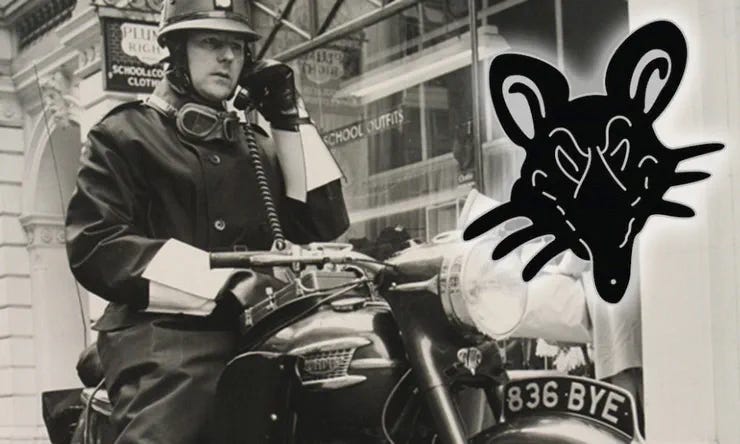London, 2023: a ‘blade runner’ poses with vandalised ULEZ cameras
Before I start complaining about the relentless march of our cyborg overlords, I would point out I’m no luddite - I adore technology. For example, I’m typing this article on a pointlessly powerful Razer gaming laptop with more processing power than I’ll ever require. Why? Because I can. It’s why we buy Porsches, yet drive them in cities with ruthlessly enforced 20mph speed limits. Or use state-of-the-art sushi knives to cut cheese. It’s Capitalism, baby, and I’d be lying if I said I didn’t like it.
On the other hand, I’m not an ‘early adopter’ who’ll hungrily snap up the latest tech for the sake of it. I would describe myself as an incrementalist - I’ll never queue for a new iPhone (not least because I am an avowed apple-sceptic) or any other device. I’ll let the hype - and prices - die down. I’ll wait for the software patches and hardware upgrades. Then I’ll pounce, usually during a sale.
This, I would suggest, is a healthy attitude to technology as both a consumer and an end-user. Sure, early-adopters are an essential part of the tech ecosystem, the shock troops prepared to suffer the slings and arrows of v1.0 so the rest of us don’t have to. So, actually, are the techno-sceptics, people who only grudgingly move with the times and question the necessity of change. They’re a brake on the propeller-heads who invent things simply because they can, not because they should.
As ever, it’s balance in all things. And, my friends, the cosmic balance is seriously out of whack. Governments and law enforcers at all levels are behaving like early adopters and propeller heads, while the cautious and sceptical are increasingly marginalised. There’s an imbalance in The Force, Luke, and it tilts towards the guy in the big black mask and a cape.
I wouldn’t mind if it worked properly.
Which brings me to technology, law enforcement and the consequences thereof. Such as the rise of the ‘Blade Runners’, a masked underground sworn to destroy anti-car techno surveillance, cruelly imposed upon them by a Sheriff of Nottingham-style mayor who marries tax-grabbing with eco-zealotry (other interpretations are available).
I also write as someone well-versed in surveillance as an intelligence and evidential tool. I’m also as an unapologetic libertarian when it comes to freedom of speech, privacy and expression.
Yes, I’ve lived a life of contradictions. Here’s the result.
As an exercise, I decided to compare and contrast the police officer of 1993 with their 2023 counterpart. In 1993 there was no geolocation of police radios (which were analogue) or vehicles. Radios could not be used as two-way receivers, either overtly or covertly (for workplace safety and surveillance). There was no body worn video (BWV) to record every transaction between police and public. There was no internet, facial recognition or digitised biometrics (there were biometrics, as technically old-school inky fingerprints count). There were no drooling morons with camera phones (well, there were drooling morons in 1993, some of whom even found themselves in the police, but no camera phones). Until the late 2010s, there was no UK-wide police intelligence database (now known as PND). Police couldn’t rely on automatic numberplate reading technology (ANPR). CCTV networks were non-digital and limited in scope, scale and accuracy. As for drones? Pure science fiction for the copper of 1993.
And that’s before we even consider any Frankenstein-like law enforcement experiments with artificial intelligence.
So things have changed. Over the past thirty-odd years, the tech and private security industries have persuaded police forces their products would do what they always say they’ll do - reduce costs and liberate the workforce to do other, more productive stuff. Ha ha ha. The Met, in 2017, was still running on Windows XP.
Anyhow, the following struck me while writing the list;
(1) There was far less bureaucracy in 1993. The idea that technology reduces paperwork is pure bullshit. I give you RIPA, for example. Every process requires an application, supervision, authorisation, audit and closure in triplicate. The police admin monster loves this stuff, as does the police complaints industry, compliance people, activists, media and legal establishment. Yes, we need checks and balances (we really do), but the unicorn of balance between operational and bureaucratic efficacy remains a creature of myth.
(2) This problem is exacerbated by the simple fact technology moves quickly while law, procedure and management dogma moves slowly. An example - working as an online investigator, I was asked to list every research tool I used on each tasking, in case I missed something and the management wanted a steward’s inquiry (AKA ‘dust off the blame-thrower’). I explained that would take more time than the tasking itself, and in any case searching everything on the web is more or less impossible, even with banks of powerful aggregators and other hi-tech folderol. Furthermore, in the time it had taken to have the conversation about research methodology, probably a dozen more new free tools had dropped onto the internet. I’d find them on the fly. I kept my online activity and search histories recorded for disclosure purposes. Wouldn’t that do? No, it wouldn’t. I also noted some of the compliance staff were people who would struggle to turn on a PlayStation.
(3) People have shrugged and accepted their creeping digital panopticon (until ULEZ, a technological Poll Tax moment for London in my opinion), assured by a powerful tech industry that cameras and IT systems would keep people safe (more bullshit - people keep people safe). This is a political issue as much as a law enforcement problem, although Gen Z (who have never known a world without the Internet) seem less viscerally opposed to the idea of creeping ‘social credit’ style narratives. In fact, given the popularity of authoritarian social justice ideology, I see this as precisely where we’re going. Using soft-law measures to penalise people for driving cars one day, to having wrongthink opinions the next. ‘Cancel Cam’, coming to a place of education near you!
(4) Technology killed discretion. It’s difficult to be your true self when everything you do is being recorded for posterity. I remember, as a uniformed Pc in the early 1990s, dealing with a landlord / tenant dispute involving a group of truculent Australian backpackers. I solved it using a combination of threats, charm, bombast, no little effing and blinding and a big dollop of the Ways and Means Act. It was - unambiguously - not a performance I’d have put on camera. It did, however, get the job done to everyone’s satisfaction. I even got a letter of thanks. I’ll talk more about discretion later.
(5) Too many politicians, policymakers and senior police officers haven’t a bloody clue about technology. It’s like giving a chimp a block of Semtex and a blasting cap (qv the Online Safety Bill). Working in the Met’s Counterterrorism Internet Referral Unit, I remember a staff officer demanding I ‘take down’ a tweet that offended a chief constable’s sensibilities (for reasons, although trifling, I’m not sharing here). The staff officer was genuinely baffled when I told them it wasn’t in the gift of a police officer in London to dictate the editorial direction or content of a company headquartered in tax-friendly Dublin and with servers housed in California. This mindset by police leaders, although amusing, is fucking dangerous. It’s another example why sensible people everywhere should roundly reject the moronic 'Online Safety Bill’, a piece of legislation which would give Xi Jinping a chubby.
Road to Hell. Good Intentions. Yadda yadda.
‘Remove this tweet for The Empire, Dc Adler’
At this point, I’m sure many decent people with benign motives will make arguments to the contrary, a few of which might turn on a Think of the Children fallacy. Fair enough, but I’ve given evidence against a paedophile at the Old Bailey - my arguments are made in good faith and borne from experience. I very much doubt forcing WhatsApp and Signal to quit the UK will stop creatures with predatory sexual preferences from finding other ways to communicate (long prison sentences, on the other hand, do).
For me, the issue is simple - you either have a right to privacy via encryption or you don’t. The idea the State has the divine right to read all private communications between individuals is wrong. I might be persuaded otherwise if I hadn’t experienced how thinly politicians and police occasionally interpret the rules when it suits them. Like the staff officer and the tweet I referenced earlier - would you trust them to make informed judgements on interception? Put simply, I don’t trust the safeguards offered within the Bill.
Hey, you could put a camera and mic in everyone’s house, right? I think the Scottish government might approve of that one. Or we could be in East Germany, circa 1982 (which, incidentally, didn’t work even though about a third of the population were informing on each other).
You might ask me for a preferred solution. Fair enough. The first is, you guessed it, nail the crow to the barn door. If offenders were properly punished for their crimes in the first place, people might commit less of them. Yes, I’m looking at the laughably soft sentencing we give sex offenders of all stripes. What the proposed Bill says is law-abiding people need to potentially surrender their privacy to the State… because it’s too expensive or troublesome to lock up criminals?
Please. That’s bullshit. It’s giving everyone detention because the kid at the back of the class won’t stop misbehaving.
Or how about less reliance on technology and more on humans? Experienced, properly paid and trained social workers and teachers should be better at picking up signs of child abuse in the field. Paedophiles, often offering information after arrest, are better at pointing the finger at other child sex offenders. International cooperation between police investigators is better at tackling interjurisdictional criminals.
There’s been a sad anniversary this week which offers a salutary lesson in overreliance on technology. As America realised on the morning of 12th September 2001, they’d retreated too much from field work and increasingly relied on SIGINT intercepts, analysis and data. They let their other skills atrophy, happily drinking tech snake oil rather than risky, dirty stuff like running flesh and blood assets.
Yes, technology has its place. So do people.
And so to 2023, when intelligence and surveillance technology is mainstreamed to the point anyone can afford it. Now we can monitor human virtue 24/7, how else will it be used? What are the possible outcomes for everyday policing and civil liberties? The two are intricately entwined - if you really want to police by consent, that is.
Environmental responsibility is an obvious example. It proves my suspicion that, although prone to groupthink, the powers-that-be aren’t the cohort of shapeshifting lizards many internet dwellers suspect. If they were, they wouldn’t have made the cardinal error of aiming their techno-Death Star at the issue guaranteed to make hitherto docile Britons very, very cross indeed. They went and fucked around with their right to enjoy the internal combustion engine.
It’s a lazy journalistic trope that the environmental agenda is usually advanced by a clique of urban, left-of-centre, Guardianista intellectuals with little love for, or understanding of, people who live in suburbs and rural areas (or, indeed, outside of Zone 2 of the tube). Nonetheless, there has to be some truth in it. Why else would anyone try to slip fifteen minute cities, 20mph speed limits, complex traffic management systems (to enable cycling, rickshaws, penny farthings and pogo-sticks) and ULEZ-style penalties under the noses of Middle England? A place as real, tangible and powerful in its own way as La France Profonde?
The result? Regressive, tech-enabled taxes by parochial robber barons, spawning a revolt by balaclava-wearing rebels, creeping around at night destroying cameras (in a number of gloriously imaginative ways). Which, when you think about it, is quite French too.
And, going back to 1993, this is what happens when you start replacing traffic rats with cameras. Bear with me, okay?
Come back, Ratty. All is forgiven.
The early 1990s saw the first ‘Gatso’ speed cameras, which were non-digital. The first was switched on in 1992 on the A316 in Twickenham. Ever since, the numbers of traffic police have fallen as cameras became the new road safety panacea.
Except, of course, they aren’t. They’re marvellous at revenue-harvesting, of course (which is why local authorities love them). They almost certainly help reduce some accidents. But when was the last time a traffic camera caught someone drink-driving? Or driving dangerously (within a speed limit)? Or driving without a licence or insurance? Do cameras help the poor bastards whose licence plates are cloned? No, councils spam them with demands for money instead, then send in the bailiffs.
Every single offence I’ve listed, by the way, I’ve seen detected and prosecuted by traffic cops. Pointing this out to senior police leaders usually leads to them rolling their eyes, as they’re fully signed up to the ‘direction of travel’ narratives that suggest technology = reduced costs = good. They’re wrong, of course. They quite often are. But when did that ever matter?
And where speed cameras led, the rest followed. A vicious circle of profit and cold-blooded virtue (if you don’t want a ticket, don’t speed at 34mph or creep through that traffic light at 3am) leaves no room for discretion - unless of course you can afford a stellar lawyer like celebs and footballers.
Now we’re seeing ANPR used for emissions monitoring a la ULEZ. Soon, no doubt, other councils will see revenue-harvesting technologies they can apply to Britain’s smaller towns, for whatever crackpot political hobbyhorse they choose (I’m looking at you, the long-suffering residents of Brighton, who recently deposed their Green Party-led council).
In tandem, financially-pressed police forces will be tempted to invest even more heavily in the tech arms-race, retreating from boring stuff like, er, employing people to enforce the law. Cameras don’t need pensions, do they?
Then there’s discretion. Discretion is a subject worthy of an article of its own, so all I’ll say is this - proper policing relies on it. ‘Loser’s consent’, the process whereby people accept differences in circumstances that lead to different outcomes when interacting with the police (‘it’s a fair cop’) is crucial. It creates trust between the police and the policed. It requires officers with maturity and experience. It’s also something withering on the vine. Machines might, one day, ‘do’ discretion. Personally, I doubt it (although I’m reminded of this scene from a movie).
As of now? Here we are, among the most snooped-upon people on the planet, our lives directed and regulated by half-arsed policy makers, cutthroat tech companies and profit-focussed algorithms. And, at night, masked activists roam with angle grinders to sabotage their robot masters!
The dystopia, I suspect, is now.
I am putting myself to the fullest possible use, which is all I think that any conscious entity can ever hope to do…








I retired in 2008 prior to the widespread use of smart phones ( or idiot amplifiers as I prefer to call them). I don't think many people envisaged the effect these devices would have and how much extra work they would generate for law enforcement and the legal profession. One thing I noticed was that new technology was always seen by the political class as a replacement for boots on the ground, not, as Ray said a support.
I take no joy in seeing the chickens come to roost now. After the Peckham shoplifting incident I see people from all sides are calling out for a return to 'old fashioned community policing', would they be the same people who said that that method of policing was old fashioned and inefficient?
Finally I see that the policing minister has 'ordered police to run the faces of all shoplifting suspects through facial recognition systems'. No mention is made of how this will be actioned but as the govt are probably being spoken to by big retailers something will happen, still we are back to the era of everything being a priority and I fondly remember very senior officers barking that everything had to be done. Happy days for those still serving. Glad I'm out.
Another stellar piece. I could barely disagree with a word, especially the observation that those who were around a few decades ago can see the horror show of the creeping authoritarianism in a way that our children cannot. Maybe that is part of the calculation; a 40 year plan that will come to fruition when the dinosaurs die off and only those who have grown up with this intrusive technology are left. I find myself, as a natural conservative English liberal, attracted by Neil Oliver’s call for a revolution. How did that happen?